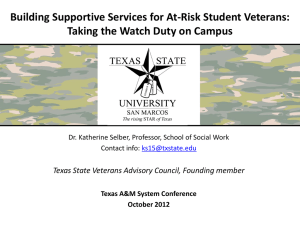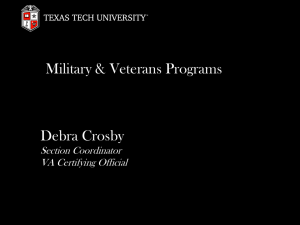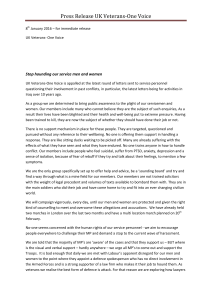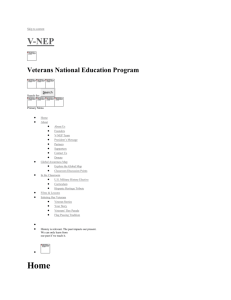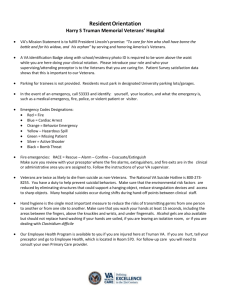Today's Student Veteran
advertisement
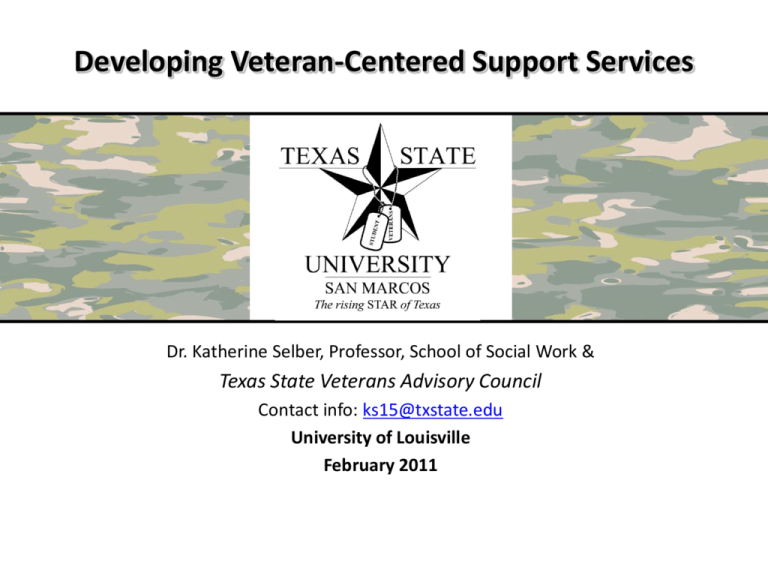
Developing Veteran-Centered Support Services Dr. Katherine Selber, Professor, School of Social Work & Texas State Veterans Advisory Council Contact info: ks15@txstate.edu University of Louisville February 2011 Presentation Overview • • • • • Background on Texas State’s Veterans Initiative. Needs assessment study. Veterans support services @ Texas State University. Emphasize Health & Behavioral Health Support Services Lessons Learned on program development. Texas: Home to Many Veterans & Dependents • Texas has over 1.7 million Veterans • Ranks 3rd in number of veterans • Ranks 2nd in female veterans 2009 (160,000) • Has 16 military installations • Ft. Hood has deployed more troops than any other installation in the U.S. some have deployed 6 and 7 times • Has been home to more Military Widows that any other city in the country • Large concentrations of Guard & Reserve Map of Military Bases in Texas Sources: http://www.texvet.com/facts.asp & http://www.tvc.state.tx.us/ & Grace After Fire www.governor.state.tx.us/divisions/tmpc Texas State University- San Marcos • Located in San Marcos- central Texas between Ft. Hood & Ft. Sam Houston/ Lackland AFB • 32,000 students • 35% are ethnic minorities • Is a Hispanic Serving Institution (HSI) (25%) • Has tradition of two ROTC units • Our most famous alumPresident Lyndon Baines Johnson This Generation of Student Veterans@ Texas State • 1745 veterans & dependents •90% vets/ 10%Guard/Res • 10% Graduate/ 90% Undergraduate •70% male/ 30% female • Most are full time students •65%Anglo /35% ethnic minority • 2nd largest vet enrollment of 4 year colleges in Texas Texas State’s Philosophy & Key Steps in Developing a Model Since 2008 Develop Internal Team • Key Departments • Right People • Commit to Veterans • Share Credit • Keep Vets at Center • Strengths Based Approach Develop Student Veteran Organization Develop External Partners • Seek Input Student Veterans • As Team members • Grow Student Veteran Organization • Unleash Leaders • Reach Out to Community Partners • Bring Services to Campus • Seek Grants & Outside Resources Keeping Us Veteran-Centered Focus Groups- yearly Individual Interviews with VetsEach semester 30 interviews Needs Assessment on-line Dominque LaVista © Veteran participation & input in all events & activities Needs Assessment March 2010 On-line needs assessment March 2010 N=338 (26.7% response rate) (1252 total distribution) Process for Developing instrument Topics: adjustment, health, educational, financial, and career issues, military background, demographics Time: 20-30 minutes to complete Student Veterans Reported Unmet Health Needs • Overall medical needs (32%) • Psychological needs (23%) Sleep needs (40%) Needs concussive event (6%) Job& Career Concerns of Student Veterans • Major or Moderate Concerns about all aspects of their futures: – – – – Finding a job (64%) Being happy with a job (61%) Sustaining certainty in career plans (55%) Maintaining confidence about job search (49%) • About 1/3 needed part-time work • Student Veterans see a university degree differently than traditional students Texas State Student Veterans are At-Risk • • • • • Multiple deployments (71%) To combat zones (94% Iraq) (17% Afghanistan) Wounded, injured or physically hurt during military service (41%) Still having trouble with injuries (44%) Having health problem related to deployment other than wound or physical injury (38%) Dominque LaVista © Risks of Dropping Out • 21% stated they were experiencing difficulties that may make them drop out; – – – – 69% of those said it was due to financial difficulties 39% said due to educational challenges 33% due to health issues 38% due to personal issues Overview of Support Services @ Texas State • Orientation &Academic Support • Health & Behavioral Health Support • Career & Employment Services • Campus Training & Awareness Orientation & Academic Support • Veteran only orientation services semester prior to enrollment & first week by vets • Occupational Education major with high flexibility uses portfolio approach for granting credit Orientation & Academic Support Services One-Hour Required Freshman Seminar, Peer Speakers • Vets Only Sections • Topics: Campus & Community Services; Financial Aid; Employment; Career Advising; Self Care; Stress Management; Relaxation & Sleep Needs; Relationships • Assignments- vet resource fair, journals, transition paper Dominque LaVista © Dominque LaVista © Dominque LaVista © Health & Behavioral Health Support • Individual & Group Counseling Services by Vets- our staff & Vet Center staff • Initial agreements to have VA sign up vets for health care Health & Behavioral Health Support Veterans Alliance @ TxState Over 400 members Monthly luncheons, brief speakers100 + attend Events- 5k race, Veterans Day, Intramural Sports Monthly socials Student Veterans of America chapt. Training in State Peer-to Peer Model Dominque LaVista © Health & Behavioral Health Support Family & Friends of the Military @ TxState For spouses, significant others, siblings, parents, friends Help Support Veteran events Monthly socials Training in Family Resiliency Models Dominque LaVista © Health & Behavioral Health Support Dominque LaVista © Sleep Study with Respiratory Care Department *Outreach for Pilot Sample *Actigraph Watches *Preliminary Results *Refer to Sleep Clinic *Refer to VA or Private Practice *Meditation Group StartingMindfulness Meditation Health & Behavioral Health Case Management: Assessment, Referral, Linkage, Follow-up – Social Work Masters Interns Assigned to Veterans Initiative – Faculty Supervised – Called Veterans Interns – Outreach to vets • • • • • From Veterans Affairs Office Calls for those on Alert List due to low GPA Self referrals Referrals from faculty, staff- disability services Voluntary – Focus on first year vets Health & Behavioral Health Support Dominque LaVista © Wounded Warrior Alternative Scuba Diving *Partnership with Center for the Intrepid Ft. Sam Houston *Texas State Aquarena *Outreach to recruit to campus as students *Veterans Alliance gives back Career & Employment *Partner with Texas Workforce Commission Veterans Leadership Project *Partner with Goodwill Industries to bring their employment team to campus via Texas Veterans Commission Texas Lottery funding *PACE center opens 2012- electronic portfolios *Use of Social Work Interns for job assists Campus Training & Awareness Campus-Wide Training for Faculty & Staff : Helping Veterans Succeed: who are vets, where have they been, challenges, tips for working with, campus resources Workshop format 1 ½ to 3 hours Twice a semester & by special request Tied into Veteran Friendly Office Program Award Plaque Started with Academic advisors Campus Training • Social Work Elective Course/Next Step Certificate – Train social work and others to work with troops/vets – Student Vet Interviews & Team Projects Dominque LaVista © Lessons Learned 1. Vet-Centered/ Peer-to-Peer Models 2. Ask Veterans What They Want/Need 3. Develop Partnerships: Inside & Outside Best Practices & Lessons Learned 4. Start Small: Pilot & Test 5. Must Get Faculty Involved 6. Active Outreach is Essential Credits • • • Thanks to Dominque LaVista for communication design work on photos Thanks to my son for his photos from his combat deployments and for his service and sacrifice. Thanks to all the troops and student veterans for what they teach me every day. It is an honor to serve them.

